Three Brothers Blu-ray Movie
HomeThree Brothers Blu-ray Movie 
Tre fratelli / Arrow Academy / Blu-ray + DVDArrow | 1981 | 113 min | Rated BBFC: 12 | Apr 04, 2016
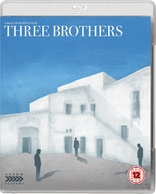
Movie rating
6.5 | / 10 |
Blu-ray rating
| Users | 4.0 | |
| Reviewer | 4.0 | |
| Overall | 4.0 |
Overview
Three Brothers (1981)
Three men face their mother's death.
Starring: Philippe Noiret, Michele Placido, Vittorio Mezzogiorno, Andréa Ferréol, Maddalena CrippaDirector: Francesco Rosi
| Foreign | Uncertain |
| Drama | Uncertain |
Specifications
Video
Video codec: MPEG-4 AVC
Video resolution: 1080p
Aspect ratio: 1.86:1
Original aspect ratio: 1.85:1
Audio
Italian: LPCM Mono (48kHz, 24-bit)
Subtitles
English
Discs
50GB Blu-ray Disc
Two-disc set (1 BD, 1 DVD)
DVD copy
Playback
Region B (locked)
Review
Rating summary
| Movie | 4.0 | |
| Video | 3.5 | |
| Audio | 3.5 | |
| Extras | 2.0 | |
| Overall | 4.0 |
Three Brothers Blu-ray Movie Review
Reviewed by Jeffrey Kauffman May 14, 2016My Brothers was one of the more potent reviewing pleasures of mine in 2013, and it’s still somewhat baffling that this intimate but extremely moving film about three male siblings didn’t make more of a dent during either its theatrical exhibition or its ultimate release on Blu-ray. At least somewhat similarly, Three Brothers is also rife with the interactions between a trio of siblings, again (as with My Brothers) sparked by mortality (or at least threatened mortality) within the family. Also at least somewhat like My Brothers, Three Brothers has not had much of a home video life, despite the fact that it received an Academy Award nomination for Best Foreign Language Film in 1981. My Brothers’ titular boys were in fact boys, young guys still wandering through the thicket of outright childhood or at best young manhood, while in Three Brothers the titular sibilings are now adult men, though their childhoods play into the overall emotional arc of the film. Also linking these two entries is the fact that both film evocatively weave the countries of the brothers’ birth into the stories. In the case of My Brothers, it’s Ireland, while in the case of Three Brothers, it’s Italy. Three Brothers has the same spacious languor that informs other Italian films taking place at least some of the time in rural environments, with the characters living in the rhythms of the seasons and the land.
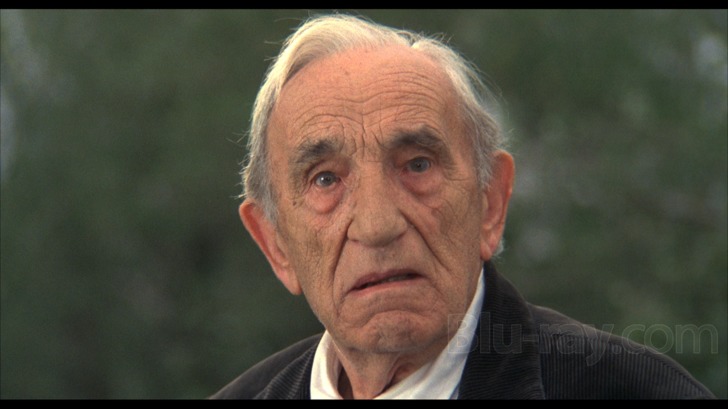
Despite the fact that both he and his films have accrued a long line of prestigious awards or nominations, including the aforementioned Oscar nod for Three Brothers as well as a Palme d’Or (for Il Caso Mattei in 1972) and an honorary Golden Bear (for lifetime achievement in 2008), director Francesco Rosi’s name has never really risen to the heights of some of his Italian contemporaries. This seems especially odd when one considers the fact that Rosi is less of a fabulist than, say, Federico Fellini (even if Rosi occasionally works in the same quasi-magical realist milieu that Fellini often did), instead offering gritty and relatively realistic works which often have one foot in fiction and the other in a sort of verité ambience that makes them play like documentaries. Rosi’s work frequently had a sociopolitical edge, especially in the 1960s and 1970s, and while Three Brothers is more of a character study than a screed, there are certainly sociopolitical elements at play in its slowly unfolding tale of three brothers returning to their elderly father’s home in the wake (no pun intended) of their mother’s passing.
It may not be magical realism in the way that contemporary film goers used to the extravagances of, say, an Alejandro González Iñárritu might define it, but there’s a thin line between memory, fantasy and reality which tends to inform Three Brothers at various points. One of these is in the early going, where it’s not overtly depicted, but still quite clear, that elderly farmer Donato (Charles Vanel) has lost his wife (the death is of course explicitly mentioned and dealt with a bit later in the story). A dreamlike sequence featuring the ancient matron waving “goodbye” sets a properly elegiac tone for what is in many ways a rather bittersweet film. Donato puts out the word to his three sons to return home, and it’s at this point that the differences between the sons (and their relationship to their father) start to come into play.
Eldest son Raffaele (Philippe Noiret) is a Judge who’s involved in some high level cases involving organized crime and “professional” militias, cases which may in fact be threatening his life. Rocco (Vittorio Mezzogiorno) works at a boarding house (perhaps an orphanage) of sorts for wayward youth, while Nicola (Michele Placido) is a blue collar type who is getting increasingly involved in some labor uprisings. As should be immediately apparent, Three Brothers doesn’t shy away from any number of sociological and/or political elements, though in this case, these aspects assume more of a foundational or back story ambience than some of the screed like approaches that inform other Rosi films. Rather interestingly, while there’s certainly fair amounts of dogma debated between the brothers, instead the film tends to treat each character separately, at least in terms of their own particular “issues”, before bringing them together for interstitial scenes at their father’s farm.
It’s obvious that Rosi is utilizing these characters to weave an allegory about “contemporary” (meaning circa 1980s) Italy, and the differences in class and temperament do inform the film in often quite interesting ways. But the film may work less well as a “symbol” for outsiders (meaning non-Italians), leaving the real interest to be found in some apparently simple and small scale, but nonetheless, rather moving scenes between various characters. Chief among these are some lovely, quiet but portentous moments between Donato and his sweet granddaughter. Three Brothers tends to caution the audience that these peaceful respites are perhaps the exception to the rule in the Italy of the time, as some near terrorist level activities begin to enter the fray, at least with regard to Raffaele. (One of the more “shocking” sequences involving incipient violence again tips over into near fantasy, ultimately revealed to have been a dream—or nightmare.)
What is perhaps hinted at if never really stated outright is the thought that if a relatively small family can’t come to terms with their differences, how then can it be expected that an entire nation will be able to? Rosi uses Donato and his sons as a microcosm through which to view Italy as a whole, but it’s commendable that the characters are fully fleshed out and not merely “types”. The story unfolds in a series of vignettes, including the suffusion of memory pieces that suddenly intrude like unexpected visitors, another element which adds to the film’s elegiac tone. Though the two films are manifestly different in style, content and, yes, tone, I was reminded of Bernardo Bertolucci’s 1900 at various points throughout Three Brothers. Both films weave a tale of epochal sociopolitical upheavals through the prism of more intimate character studies, and both revel in the glories of the Italian landscape. Rosi is perhaps a bit more restrained than Bertolucci (who can tip over into a kind of florid quality at times), but he provides some significant emotion and intelligent discussion of what it means (or at least meant) to be Italian.
Three Brothers Blu-ray Movie, Video Quality 
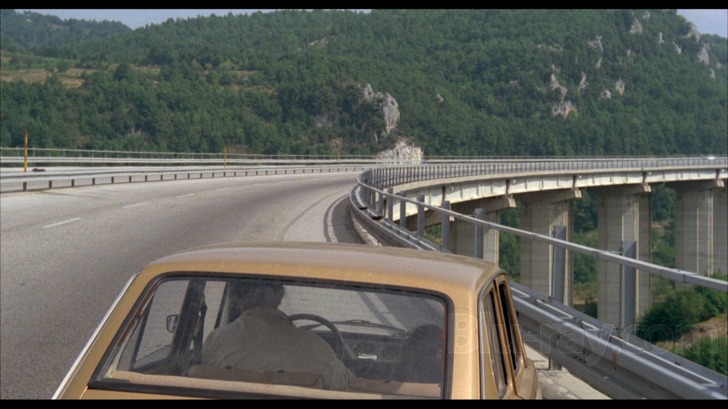
Three Brothers is presented on Blu-ray courtesy of Arrow Films with an AVC encoded 1080p transfer in 1.86:1. Rather surprisingly given the film's status and its legacy as an Academy Award nominee, there had evidently been no previous home video releases before this, and Arrow's booklet details a new 2K restoration done for this release from unspecified "film elements". There are some very minor signs of age related wear and tear on display, most of which boil down to tiny flecks that dot the frame, but on the whole from a damage perspective, things look great. The palette seems just slightly anemic at times, leaving some of the verdant green foliage of the Italian countryside tending to look a bit gray at times. That said, in brightly lit scenes (especially those outside), the palette is wonderfully warm and detail levels are excellent (see screenshot 1). Brightness struck me as a bit overamped at times, leading to some blown out highlights. There are some occasional and relatively minor issues with image instability, including aliasing on elements like the gate that leads into the courtyard of Donato's farm estate. Grain is fairly heavy at times, but resolves naturally throughout the presentation.
Three Brothers Blu-ray Movie, Audio Quality 
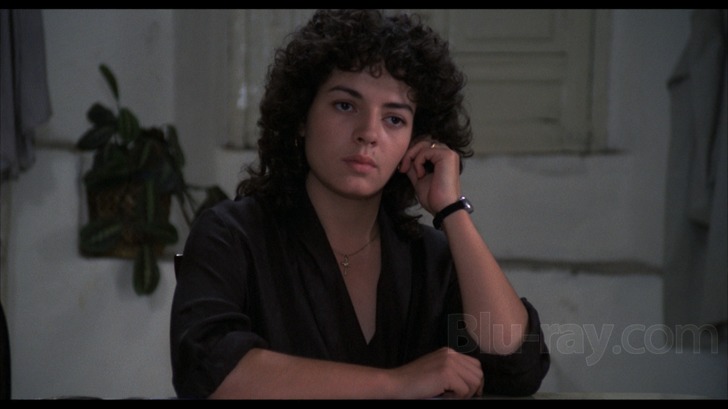
Three Brothers features a decent sounding LPCM mono track in the original Italian. While I haven't been able to track down any explicit information in this regard, I'm assuming that this was either done in the "traditional" Italian way, meaning all dialogue was looped later after filming, or at least some actors (notably Noiret, who I'm assuming spoke French on set) were dubbed later, for there's a noticeable disconnect between lip movements and dialogue being spoken throughout the presentation. That distraction aside, there's no real damage to report and the track, while a bit shallow sounding, offers good reproduction of dialogue, effects and Piero Piccioni's score.
Three Brothers Blu-ray Movie, Special Features and Extras 
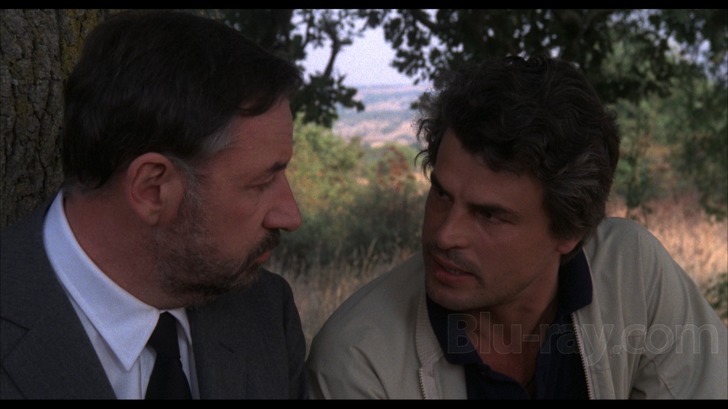
- Interview with Francesco Rosi (1:12:12) is an audio supplement (playing out over photos) from 1987.
- Theatrical Trailer (3:20)
Three Brothers Blu-ray Movie, Overall Score and Recommendation 
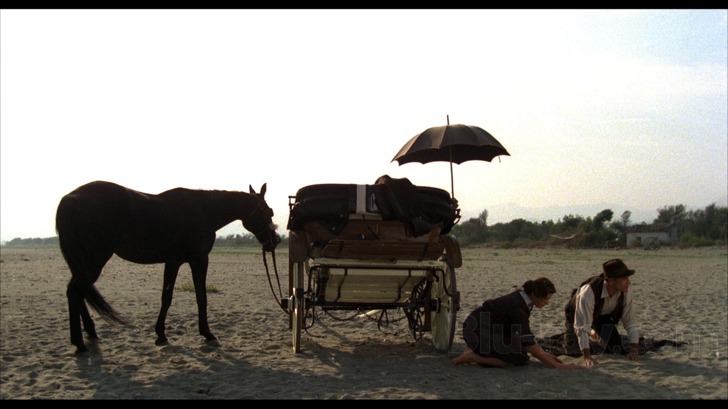
Three Brothers weaves its spell rather slowly, but it is ultimately a very moving film and one which benefits from its rather languorous pace. The film may "mean" more to those up to speed on the roiling sociopolitical atmosphere of Italy in the 1980s, but anyone who has had "issues" with their siblings will certainly understand the subtext of the film without the need for much extraneous coaching. Technical merits are generally very good to excellent, and Three Brothers comes Highly recommended.
Similar titles
Similar titles you might also like

Accattone
Masters of Cinema
1961

Umberto D.
1952

Bicycle Thieves
Ladri di biciclette / Arrow Academy
1948

La Dolce Vita
1960

Shoeshine 4K
Sciuscià
1946

Nights of Cabiria
Le notti di Cabiria / Vintage World Cinema
1957

The Great Beauty
La grande bellezza
2013

I Vitelloni
1953

Il Sorpasso
The Easy Life | Limited Edition
1962

Rome, Open City
Roma, città aperta
1945

Paisà
Paisan
1946

Le Amiche
The Girlfriends / Masters of Cinema
1955

The Conformist
Il Conformista / Arrow Academy
1970

L' Eclisse
1962

L' Avventura
1960

Theorem
Teorema
1968

Roma
Masters of Cinema
1972

Breathless 4K
À bout de souffle / Vintage World Cinema
1960

Gomorrah
Gomorra
2008

A Special Day
Una giornata particolare
1977